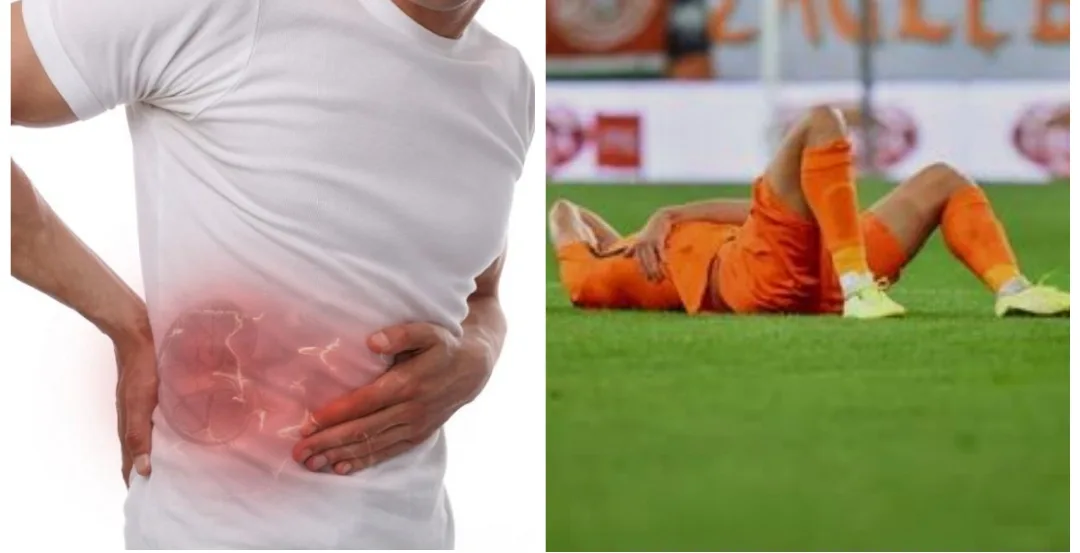Kidney Stones (also called renal calculi) are hard deposits made of minerals and salts that form inside your kidneys. Diet, excess body weight, some medical conditions, and certain supplements and medications are among the many causes of kidney stones.
A kidney stone is a hard object that is made from chemicals in the urine. Usually, having enough water washes them out or other chemicals in urine stop a stone from forming.
Also read: Ulcer : Meaning, Causes, Types And 4 New Major Bad Effects On Young sports Enthusiasts
Sometimes, tiny stones move out of the body in the urine without causing too much pain. But stones that do not move may cause a back-up of urine in the kidney, ureter, the bladder, or the urethra. This is what causes the pain. Kidney stones rarely cause permanent damage if treated by a health care professional.
The chemicals responsible for kidney stone formation include calcium, oxalate, urate, cystine, xanthine, and phosphate.

Substance that contains some of the chemicals responsible for kidney stone
Calcium Oxalate Stones: most common stones
Some examples of foods that have high levels of calcium oxalate include peanuts, rhubarb, spinach, beets, Swiss chard, chocolate and sweet potatoes. Limiting intake of these foods may be beneficial for people who form calcium oxalate stones which is the leading this type of kidney stone.
Urate
The high acid concentration of the urine makes it easier for uric acid stones to form. To prevent uric acid stones, cut down on high-purine foods such as red meat, organ meats, beer/alcoholic beverages, meat-based gravies, sardines, anchovies and shellfish.
What can form Cystine into kidney stone?
Eating meat: produces urine that has more acid, which can increase your risk for cystine stones.
Reducing salt: Eating less salt can help keep cystine stones from forming. Try not to eat salty foods, including potato chips, French fries, sandwich meats, canned soups, and packaged meals.
What causes xanthine kidney stones?
Hereditary xanthinuria is caused by a deficiency of xanthine dehydrogenase/oxidase (XDH/OX), leading to a reduced degradation of hypoxanthine and xanthine to uric acid, and the accumulation of these two uric acid precursors.
To prevent calcium phosphate stones:
it is advisable to restrict the intake of animal protein. This includes foods like milk, eggs, fish, shellfish, chicken, mutton, beef, and pork, particularly organ meats. Consuming less animal protein lowers the chances of developing kidney stones.
Types of kidney stones
There are four types of kidney stones:
1) calcium oxalate,
2) uric acid,
3) struvite, and
4) cystine
Common symptoms include

Severe pain in lower back, side, and belly: Kidney stone pain — also known as renal colic prior history or family history. The pain caused by the ureter contracting to expel the stone tends to occur in periodic waves. These waves can intensify the discomfort fairly and recur over a span of minutes.
Blood or pain in your urine: When the stone reaches the point where your ureter and bladder meet, you will experience pain during urination, which may be referred to as dysuria by your doctor. This pain can either be sharp or burning in nature. If you are unaware of the presence of a kidney stone, you might confuse the pain with a urinary tract infection. Occasionally, an infection can also occur concurrently with the stone.
In terms of the blood in the urine, it can be red, pink, brown or looks cloudy.
Fever and Chills: Symptoms of fever and chills indicate the presence of an infection in the kidney or another area of the urinary tract, which can be a severe complication of a kidney stone. However, they can also indicate other grave issues apart from kidney stones. It is crucial to seek immediate medical attention for any case of fever accompanied by pain.
Typically, fevers associated with infections tend to be high, reaching 100.4˚F (38˚C) or higher. Shivering or chills commonly accompany the fever.
Dehydration: The condition in which water in the body drops below normal levels, usually caused by illness, sweating or by not drinking enough. This also can lead to kidney stone.
Treatment of Kidney Stones
Treatment depends on the type of stone and the severity of your symptoms.
Some people with severe pain from kidney stones need to stay in the hospital. You may need to get fluids through an IV into your vein.
Kidney stones that are small most often pass through your system on their own.
Your urine should be strained so the stone can be saved and tested.
Drink at least 6 to 8 glasses of water per day to produce a large amount of urine. This will help the stone pass. Pain can be very bad.
Over-the-counter pain medicines (for example, ibuprofen and naproxen), either alone or along with narcotics, can be very effective.
For some types of stones, your provider may prescribe medicine to prevent stones from forming or help break down and remove the material that is causing the stone.
These medicines can include:
1) Allopurinol is used to treat uric acid stones.
2) Antibiotics are prescribed for struvite stones.
3) Diuretics are given to increase urine production,
4) Phosphate solutions, sodium bicarbonate, and sodium citrate are also used.
5) Water pills, specifically thiazide diuretics, are also prescribed.
Also read: Knee Ligament: 4 New Ways You Can Manage Multi-Ligament Reconstruction
6) Tamsulosin is administered to relax the ureter and facilitate the passage of the stone.
Preventive measures for Renal Canaliculi

To prevent kidney stones, it is recommended to consume approximately two to three liters of water daily, considering your activity level and perspiration rate. While water is the best choice, lemonade and orange juice can also be beneficial.
It is advised to restrict salt/sodium intake to no more than 2,300 milligrams per day. Sodium can lead to increased calcium excretion by the kidneys, thereby raising the risk of kidney stone formation. Monitoring sodium intake can be done by checking food labels.
Modify calcium supplementation, which may impact the development of calcium oxalate stones. Consuming calcium through food does not elevate the risk of stones, Consult with your physician to determine the most suitable calcium levels, particularly if you have a history of developing calcium oxalate stones.
Limit animal protein intake to a maximum of six ounces per day. Animal products such as meat, eggs, and fish contain purines, which can promote the formation of uric acid stones.
Decreasing the consumption of meat can lower the risk of uric acid stone occurrence, particularly if you have experienced them previously.
Make adjustments to calcium supplementation as it can impact the development of calcium oxalate stones. While consuming calcium through food does not contribute to stone formation, studies have suggested that taking calcium supplements without meals can affect the formation of specific stones.
It is advisable to consult your doctor for guidance on the appropriate calcium levels if you have a history of calcium oxalate stones.
Seek guidance from a dietician to receive personalized recommendations. If you are at risk of kidney stones, consulting a dietician specialising in kidney stone prevention can assist you in identifying foods that should be restricted or avoided.
Also read: Cruciate Ligament Injury! Athletes Nightmare, Meaning, Ways To Manage And Avoid It
We will create a treatment plan tailored specifically to you, taking into account the type of kidney stones you have experienced.
Note: Please keep in mind that although these foods that can cause kidney stones are generally healthy, consuming them in excessive amounts can lead to the formation of kidney stones.





